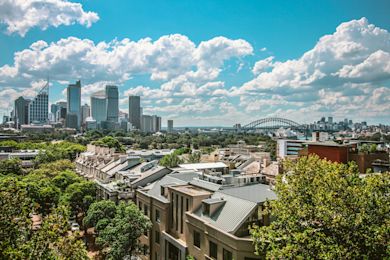المواضيع التي تم مناقشتها
- 10 min
- Published: 31 July 2025
- Updated: 31 July 2025
UK bound? Smart move!
Studying there opens doors worldwide and kickstarts your global career. But let’s get real about the next big question: How much does it actually cost to study in the UK?
Truth bomb: It varies a LOT—based on the location, course, and university you choose. Think of high London rent vs chill Leeds vibe. Planning to be an engineer? That’ll likely cost more than your friend studying Sociology.
Don’t stress, though! You can always find an option that fits your budget and goals.
Read on as we break down the costs of studying in the UK for international students.
Tuition fees in the UK
Tuition fees are often the largest cost for anyone planning to study in the UK. How much you’ll pay depends on things like your course, where your university is located and the level of study, meaning the qualification you’re working towards.
IDP has compiled comprehensive data from over 60,000 courses to help you understand how much your tuition fees might cost. Below is our rundown of the average yearly UK course fees by level of study:
Level of study | Average yearly cost |
Foundation | £17,946 |
Undergraduate | £19,102 |
Postgraduate | £19,407 |
Doctorate | £19,083 |
Public vs private universities
Most UK universities are publicly funded, which helps keep tuition fees relatively low. Public universities generally offer better value, with a broad range of courses and access to extensive resources. Private universities, where the government does not subsidise the tuition fees, tend to be more expensive for all students, including international students (sometimes above £50,000 per year). However, they may have specialised facilities or teach specific programs. There are a total of five private universities in the UK - the University of Buckingham, Regent's University London, University of Law, BPP University and Arden University.
UK university fees for popular universities
University name | Average cost of an undergraduate degree per year |
£47,000 | |
£29,000 | |
£23,000 | |
£31,500 | |
£27,750 | |
£14,640 | |
£16,210 | |
£6,630 | |
£10,510 |
Join the IDP student community
Connect with peers and student ambassadors to hear real experiences, tips, and advice about studying abroad.

Cost of living in the UK for students
On top of the cost of studying in the UK, you’ll also need to consider the cost of living, including things like accommodation, groceries, transport, internet, and school supplies. Don’t forget to budget for entertainment and having fun, too!
The cost of living depends heavily on the city where you study. Here is a quick overview of what you can expect to spend per month living in some of the UK’s major student cities:
London | Edinburgh | Manchester | Leeds | Bristol | |
Rent | £600 - £1,100 | £700 - £1,000 | £700 - £1,100 | £600 - £1,000 | £600 - £1,000 |
Groceries | £160 - £200 | £100 - £200 | £100 - £200 | £100 - £200 | £100 - £200 |
Internet | £30 | £30 | £30 | £30 | £30 |
Electricity + gas | £50 | £50 | £50 | £50 | £50 |
Transportation | £80 - £200 | £50 - £60 | £60 - £70 | £70 - £110 | £70 - £90 |
Movie ticket | £8.50 - £25 | £8.50 - £15 | £8.50 - £15 | £8.50 - £15 | £8.50 - £15 |
Meal at a restaurant | £15 - £45 | £10 - £30 | £10 - £30 | £10 - £30 | £10 - £30 |
Additional costs to consider
The above costs are regular expenses you can expect to pay. However, you should also factor in irregular or one-time costs when planning your budget.
You’ll need to pay for your student visa application before arriving in the UK, which currently costs £524. You’ll also need to pay the Immigration Health Surcharge (currently £776 per year), which grants you access to the UK’s National Health Service during your stay.
While the NHS covers doctors’ visits and basic medical situations, you may still want to consider private health insurance for things like dental, optical, or mental health support. Private insurance can cost anywhere from £20 to £60 per month, depending on the provider and level of cover.
Preparing for your course can also involve set-up expenses, especially if you have to buy a new laptop or other tech, which can cost over £1,000 (if bought when arriving in the UK). Buying textbooks second-hand can help bring costs down, but you can expect to pay around £30 - £50 per month on university supplies.
It’s also a good idea to set aside some money in case of an emergency—you might need to replace your laptop, fly home unexpectedly, or have a medical procedure not covered by the NHS. Having around three months’ worth of expenses saved up can help you feel prepared in situations like these.
Scholarships & financial aid for international students in the UK
While the cost of studying in the UK may seem high, international students can apply for a range of scholarships and financial aid options that can reduce the burden of UK university fees. Use our Find a Scholarship tool to search for financial aid options.
Government-funded options include the Chevening Scholarship, which offers fully funded master’s degrees for students with strong ambition and leadership potential. Commonwealth Scholarships are available for students who are from Commonwealth countries and may not otherwise be able to study in the UK. These scholarships aim to support the development of global leaders and innovators.
In addition to government-supported financial aid, many UK universities provide their own scholarships for international students. For example, Oxford’s Clarendon Fund offers full tuition coverage and contributes to living costs for high-achieving postgraduate students. The University of Manchester has International Excellence Scholarships for postgraduate humanities students, while the University of Bristol’s Think Big Awards provide tuition support to undergraduate and postgraduate students.
How to budget for studying in the UK
Studying abroad can be expensive, but it’s entirely worth it for the incredible experiences you’ll have in your new home. Managing your finances is one of the most important skills you can learn as an international student in the UK.
Start by setting a realistic monthly budget based on your location, lifestyle, and fixed costs. London and other big cities tend to be more expensive, while student towns like Leeds or Manchester can be more budget-friendly. Once you’ve written down your fixed costs (like rent and transport), track your variable expenses like groceries, takeaway, dining out, and/or entertainment. This will help you to understand how much you’re spending every month. You might even discover ways to cut costs, allowing you to save more or have some extra money for things like travel.
Here are some practical saving tips:
Find affordable housing: University accommodation is often more expensive than private rentals in shared houses or flats. Check student housing websites or local Facebook groups for cheaper options.
Use student discounts: From cinema tickets to train travel and retail, you can get a student discount on almost anything! Sign up for websites like UniDays, Student Beans and TOTUM and always carry your student ID.
Cook at home: Preparing meals at home can significantly cut down your weekly food costs compared to eating out or ordering takeaway.
Take advantage of free events: Many universities and cities host free cultural, networking, or educational events. Visit your institution’s website to find out what’s going on around campus. These are great for meeting people without having to spend extra cash.
Here's a sample basic monthly budget based on average costs outside of London:
Income | |
Earnings from part-time work | £1,000 |
Savings | £1,000 |
TOTAL | £2,000 |
Expenses | |
Rent | £700 |
Groceries | £200 |
Utilities + bills | £130 |
Entertainment | £200 |
Public transport | £150 |
Other expenses | £100 |
TOTAL | £1,480 |
Savings | £[remainder] |
Conclusion
Studying in the UK is an incredible opportunity, but it’s important to take into account the potential costs before you take off. With a bit of planning, a solid budget, and making the most of discounts and scholarships, you’ll be able to enjoy the full UK student experience! Talk to an IDP counsellor today to get personalised guidance.
One account for all your study abroad needs
Create your profile and unlock a wide array of features including personalised recommendations, fast-tracked applications and much more.











